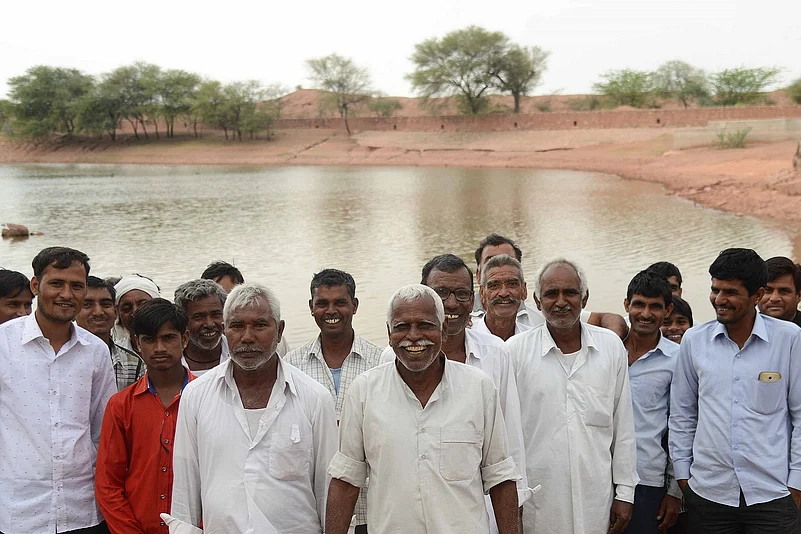Small and marginal farmers constitute the largest group of cultivators in Indian agriculture – 85% of operated farms are less than two hectares, 66% are less than one hectare. These farmers are vulnerable to a multitude of risks and many are struggling to survive.
Cementing A Platform For Farmers’ Growth
During the pandemic, ACF mobilised farmers into sharing messages on WhatsApp groups while field facilitators connected directly with farmers who did not own smartphones.

Many issues cause them distress – indebtedness, lack of information or access to and the cost of credit, poor communication linkages with the wider markets, and exploitation by intermediaries in procuring inputs and marketing fresh produce.
One strategy adopted by Ambuja Cement Foundation (ACF) to strengthen the value chain to enhance incomes and reduce transaction costs is the establishment of Farmer Producer Organisations (FPO). Built on the principles of mutual assistance, FPOs provide business services to members, founded on the principle of self-reliance.
?Interventions
Facilitate formation of FPO: ACF acts as a catalyst and supports in organising farmers in establishing their own FPO.
Strengthening FPOs in governance: While FPOs are managed by farmers themselves, ACF plays a critical role in supporting the governance of these organisations to ensure their long-term sustainability.
Bulk procurement: ACF helps FPOs in the joint bulk procurement of a variety of inputs for farms, including fertilisers, and organic insecticides.
Facilitate market linkages: ACF helps facilitate FPOs so that they can cut out middlemen and generate better profits for their members.
Farmer Producer Organizations are institutions of farmers coming together to ensure prosperity. There are different kinds of farmer's collective like Farmer Producer Companies and Co-operatives based on their legal identity. ACF provides these FPOs with hand-holding support to get them registered assistance in filling forms or setting up their own business. The Bhu Amrit Farmer Producer Company in Roorkee, Uttarakhand, is one such FPC which is known for its organic farmers owning a full-fledged organic production. While they initially started selling their produce only in local markets of Roorkee, with ACF’s support their products were later found on shelves of retail outlets in Delhi, Gujarat and Punjab.?Today, their products are also available on Flipkart and Amazon.
?Cotton Farmers
Better Cotton Initiative (BCI), a Geneva-based not-for-profit organization present in over 16 countries, works to make cotton production better for producers, the environment and the sector’s future – by developing cotton as a sustainable mainstream commodity.

?BCI focuses on effecting change: reducing the environmental impact of cotton production and improving the livelihoods of cotton farmers through the production of Better Cotton. To achieve this change, BCI coordinates a capacity building program, delivered through experienced implementing partners, to help farmers to adopt practices consistent with the Better Cotton principles and criteria. With India being one of the largest producers of cotton, BCI reached out to implementing partners such as ACF, who works with cotton farmers to help improve the quality and production of cotton in the region. As BCI does not train farmers directly, experienced and efficient implementing partners like ACF are crucial for the success of the Better Cotton Initiative.
ACF works with these cotton farmers by helping them improve their knowledge and skills in order to increase production, reduce cost and enhance profits. They do it by organizing frequent training sessions covering BCI principles, advising on healthier and more sustainable alternatives and regular pest monitoring. It also supports the farmers to prepare for the upcoming cotton season.
Initiated with just 2,552 farmers in 2009-10, the program has grown to reach and empower nearly 1.69 lakh farmers in ACF locations. Farmers have benefited from savings, reduction in pesticides, fertilizers, water, enhanced production and improvement in quality.
Additionally, BCI licensed farmers produce cotton in a way that cares for the environment, minimizing the negative effects of fertilizers and pesticides and caring for water, soil health and natural habitats. BCI farmers also commit to decent work principles – conditions that support workers safety and well-being.
Today, farmers are not only earning better profits, but are also technically sound, are supported through a peer-learning approach, are more receptive to innovation and have gained stronger positions in the entire value chain.

?During the pandemic, ACF mobilized farmers into WhatsApp group farmers where frequent sharing of video and audio messages in the local language was communicated. With farmers who did not own smartphones, ACF’s field facilitators called them up regularly to keep a continuous connection with them. Apart from this, SMS was also used as well as ACF’s community radio for broadcasting messages. With partner IDH Sustainable Trade Initiative, over 30,000 farmers registered for COVID-19 insurance with the premium cover subsidized by the funding partner. This insurance was not offered for hospitalization or medical expenses but for the recovery of livelihoods lost during quarantine or recovery period. A QR code initiative was also launched in 2018 which is proving to be very effective during this lockdown. ACF is training to share all training materials through QR codes available in community areas to help farmers gain knowledge by just scanning the QR code placed at various locations of the community area.?
(The press statement has been reproduced without any major editing)
- Previous Story
 Taapsee Pannu Confesses Love For Nine-Yard Wonder Dressed In Fusion Style Drape Pant Saree
Taapsee Pannu Confesses Love For Nine-Yard Wonder Dressed In Fusion Style Drape Pant Saree - Next Story
























